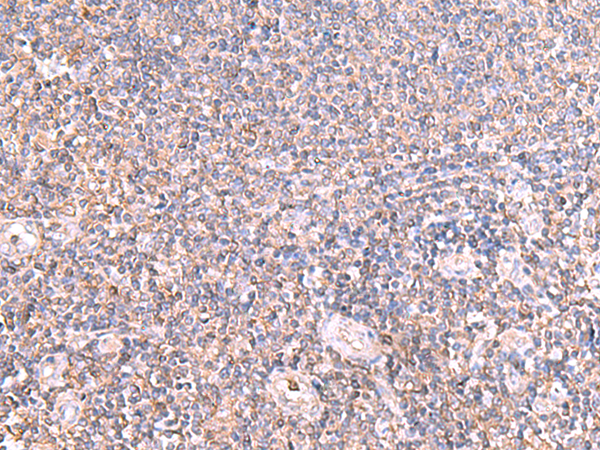
| WB | 咨询技术 | Human,Mouse,Rat |
| IF | 咨询技术 | Human,Mouse,Rat |
| IHC | 1/50-1/300 | Human,Mouse,Rat |
| ICC | 技术咨询 | Human,Mouse,Rat |
| FCM | 咨询技术 | Human,Mouse,Rat |
| Elisa | 1/5000-1/10000 | Human,Mouse,Rat |
| Aliases | HIPPI; MHS4R2; ESRRBL1 |
| Host/Isotype | Rabbit IgG |
| Antibody Type | Primary antibody |
| Storage | Store at 4°C short term. Aliquot and store at -20°C long term. Avoid freeze/thaw cycles. |
| Species Reactivity | Human, Mouse |
| Immunogen | Fusion protein of human IFT57 |
| Formulation | Purified antibody in PBS with 0.05% sodium azide and 50% glycerol. |
+ +
以下是关于IFT57抗体的3篇参考文献,信息简明扼要:
---
1. **文献名称**:*IFT57 interacts with TGF-β receptors and regulates ciliary assembly during cell migration*
**作者**:Wang J, et al.
**摘要**:本研究利用IFT57抗体通过免疫荧光和Western blot技术,揭示了IFT57蛋白在TGF-β信号通路中的调控作用,证明其通过影响纤毛组装参与细胞迁移过程。
---
2. **文献名称**:*Loss of IFT57 disrupts photoreceptor sensory cilium formation in zebrafish*
**作者**:Li Y, et al.
**摘要**:通过IFT57抗体的免疫组化分析,作者发现IFT57缺失导致斑马鱼视网膜感光细胞纤毛结构异常,证实其在视觉系统发育中的关键作用。
---
3. **文献名称**:*The role of IFT57 in Hedgehog signaling and ciliopathy-associated skeletal defects*
**作者**:Zhang H, et al.
**摘要**:该研究使用IFT57抗体进行蛋白质互作实验,发现IFT57通过调控Hedgehog信号通路影响骨骼发育,为纤毛病相关骨骼畸形提供了分子机制解释。
---
如需更详细文献信息(如期刊名称、年份等),建议通过PubMed或Google Scholar搜索标题或作者名获取全文。
×